download the pdf (  ) of this page ) of this page

Morocco is a Muslim country and, despite it is not extremist,
proper behaviour should be respected
in a way not to be offensive to the local community.
DRESS
In Marrakech, Casablanca, Rabat, and in all main towns young girls wear in a western style, easily showing navels and shoulders, and it may happen to meet a girl smoking a cigarette on the road (anyway, this is fairly rare).
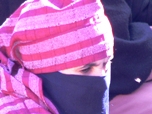
|
|
covered head
|
Tourists can accordingly dress as they like, keeping in mind that a too gaudy style may more easily make them victims of attacks of the tourist hunters. Anyway, females tourist should avoid provocative clothes, i.e. leaving too much exposed skin.
In small villages, in rural areas, in the mountains, in desert villages, the tradition is still very alive and therefore tourists are strictly required to adapt to local habits: never use shorts (males and females),
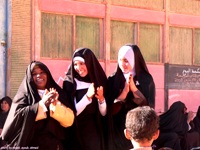
|
|
girls in the Anti Atlas
|
better use t-shirts and shirts with sleeves instead of vests (even if somewhere they are tolerated: if you wear a vest, a good advise is to carry also a shirt, to be used in case of need), never wear close-fitting trousers or skirts, etc. In some areas of Morocco and during some periods, at western eyes long trousers and covering shirts may seem unbearable, due to the great heat! But try to observe how Moroccans wear: it seems that the best defence to the heat is not to uncover, and for sure they are more experienced than the traveller..
If a traveller is trekking and needs technical wearing, either long trousers or a pareo should be kept within armís reach in a way to wear them before entering a village, in order to avoid disturbing the local culture.
PUBLIC AFFECTION DISPLAY
Another aspect deriving from Muslim culture is not to display affection in public between man and woman: two friends, either males or females, may easily walk hand in hand (there are many Moroccans used to that, and they are not homosexuals) as a friendship sign, but youíll hardly meet couples embraced or hand in hand (a part in some main towns), and even rarer is to meet couples kissing each other, even though the couple is married. This is a very uncommon habit for western travellers, but keeping it in mind is very important in order not to cause scandals, especially among aged people, who could not bear a public kiss.
Be also careful to the greeting style they first propose: a woman should never try to embrace or kiss a Moroccan male friend, especially if the wife (or someone who can tell to the wife); moreover, a male should never kiss a Moroccan woman either in public or in family.
In main maison díhotes mixed couples are not accepted (Moroccan male with European female or viceversa), a part if the couple can exhibit a marriage certificate.
ALCOHOL
Morocco has a definitely free attitude towards alcohol, despite alcohol is prohibited by religion: most people (man and young males, rarely women) are used to alcohol. But alcoholic beverages (and super alcoholics: it makes no difference if drinking a beer or a strong fig liqueur) are drunk almost in secret, trying to hide themselves from wiver' or neighbours' eyes.
It is not difficult to find alcohol: both shops and most of supermarkets donít sell them, but in Marjane supermarkets, in mixed-high category hotels and in many clubs and restaurants (even in old towns) you can find it. In Tanger, but also in Agadir, you will find alcoholics in every cafe: in the case of Tanger this is due to the close distance to Europe, while Agadir is so much a town built for tourism that it modified its habits not to dislike tourists.
If you are with Moroccans, better not to be the first proposing to drink alcohol: since you donít know how much your friends are respectful to religious rules, you risk to offend them or at least to embarrass them.
RELIGION AND RAMADAN
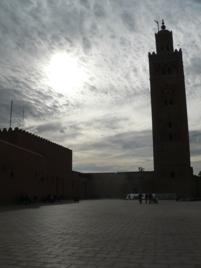
|
|
Koutobia minaret, Marrakech
|
The great majority of Moroccans are Muslims. Although not fundamentalists, they are quite respectful to the rules imoused by religion. Mosques have two separate accesses for women and men. A Muslim is required to pray at the mosque 5 times a day, starting from the sunrise up to around 9pm. For each of the 5 prays the muezzin calls the peoples to the mosque shouting the Allah akhbar (God is the greatest) from the top of the minaret. The call to pray, that the traveller will hear in every corner of the Country, is a very evocative event: in town, because some slight difference of starting time and intonation among the various muezzin create a chorus spreading over roofs and parabols, in country side for the charme of both isolation and contact with the nature.
Access to mosques is refused to non-Muslims, except in Casablanca Hassan II mosque (where, however, you have to be within a fairly expensive guided tour if you want to access).
One month a year the Muslims observe the rite of ramadan (where ramadan itself is the name of the month): from sunrise to sunset they cannot eat, drink, smoke and do, or even think about, sex; formally, sunrise is defined as the instant when you start distinguishing a black yarn from a white one, and accordingly sunset is the instant when you stop distinguishing them. From a practical point of view, the two instants correspond to the first and the fourth call to the mosque. Since the Muslim year is 13-days shorter than the western year, the month of ramadan starts 13-days earlier every year.

|
|
ramadan trumpets
|
During ramadan it is a good rule not to eat, drink or smoke in public during daytime. This is not strictly required, since a Western visiting Morocco during ramadan is not expected to respect a rule that does not apply to him/her: it is only a matter of respect for the Muslims who observe this rite (and the ramadan is very much observed). Moreover, during the day you can find few open shops selling food, but the tourist restautants will serve food (under the sad eyes of the waiters..). On the contrary, around 5pm a big movement of people invades the streets and the shops open, to allow women to buy the food for the ftor (breakfast, i.e. when they stop fasting), and the dinner.
Every Moroccan will tell you that ramadan is good for health: this is true, but it is not due to the daily fast (since in the evening they eat really a lot) but to their habit to stop alcohol consumption..
AT HOME

|
|
couscous in a family
|
If you are hosted in a Moroccan family, remember to take a necklace or a pen or a foulard, something to give if someone gives you a present (which happens most probably).
In a room where the floor is covered by carpets, take off your shoes before getting in: on carpets you always walk without shoes, even in Winter.
If you are invited for lunch or dinner, it is absolutely a good rule to compensate the received service: either you can take some food or take something to give as a gift for women or children.
MINT TEA / TAJINE
The ubiquitous mint tea is offered everywhere: in every house, in every shop, expect that after two words someone proposed you to drink a tea together:
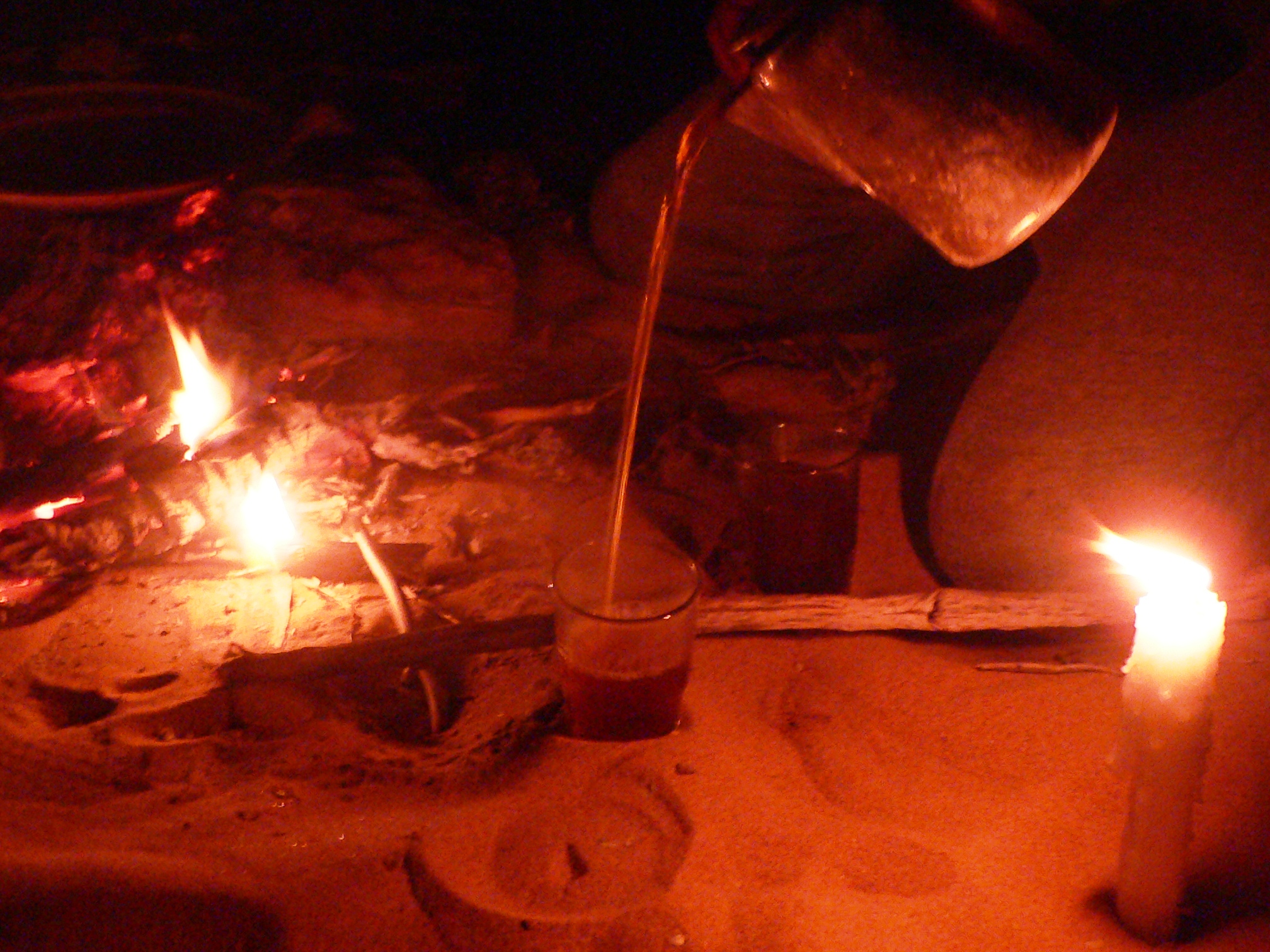
|
|
mint tea
|
if you can, donít refuse, it might be considered an offence! Remember that mint tea (called Moroccan whisky)is not a beverage but a ritual with its own timing and rules: even if you know the person offering the tea very well never propose to serve it by yourself (by the way, if you are not used it is not easy at all).
The next step after a tea is inviting you for a tajine together: that will happen as soon as you get in familiarity with someone (even simply the second time you step into the same shop!): again donít refuse, you might miss a unique chance besides really tasty. While eating a tajine, remember that:

|
it is very likely that, before the meal, someone will offer you to wash your hands from a jug: even if you just
washed them, it's a good idea to respect the habit and hand the towel to the next washing hands, and at the end help
who poured the water
|

|
the host, or the most respectable person of the group, before eating will break the round breads and distribute them;
when you finish yours, ask for more, donít help yourself
|

|
the local for enjoy your meal can be translated either bsaurahŗ (to your friends, and the answer is
latexha) or bismillah (literally in the name of Allah: this word is used, towards yourself, each
time you start an activity, as start eating, step into a house, get into a car, etc); in fact the word
bismillah, when referring to food, means Allah gives me the gift of eating only and all is essential for
me..
|

|
again the "boss" will be the first accessing the central part of the tajine (either beaf, chicken, sheep or fish):
from that time on all the others can serve themselves
|

|
eating the tajine try to use only bread, without cutlery; when you reach the meat, you
can ask for a knife (break the meat with the bread is not so easy if you are not used!) but
remember that usually in the tajine slice in front of the guest, expecially if foreign, all
the others will put some small pieces of meat ready to eat
|

|
be sure to eat only in your "slice" of tajine, without invading the rest of the dish.
|
|
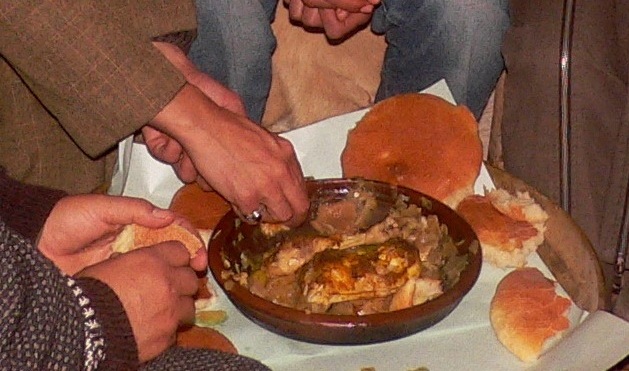
|
|
tajine
|
|
Note: Moroccans are strongly tolerant about food rules, expecially with Western travellers. That is not a good reason to avoid respecting those rules: you will make a better impression and be part of the hosting group more easily.
TIPS
Tip is always welcome, but it should be the consequence of a very satisfactory service. Calculate around the 10% of the offered service: the taxi driver who, during an excursion, stopped each time you wished to take a picture; the trekking guide, cookers and holders; waiters; everyone who show you the way in the souk without driving you to his uncle, occasionally owner of a spices shop..
CHARITY
One of the five precepts of Islam is sharing with whom has less: it is quite usual to meet poor Moroccans giving half dirham to beggers. The non Muslim traveller should adopt the same attitude as in his own Country.
Moreover, not giving to children is always a golden rule (either money, sweets, pens or anything they may ask): you avoid to put the receiver in a risky situation with respect to other children, and you would offer them the idea that working is not required, asking to rich people is enough!
MANNERS
Generally speaking Moroccans are not polite, at least as in Western conception. If you have to get on a train, be ready to see groups of screaming people, pushing to enter before the others, careless of travellers getting out. If you are buying some bread or mint at the shop and the shop is crowded, either you push a little bit or you will be served at closing time. Although sometimes this behaviour could be very annoying, getting upset is useless: adapt yourself just enough to succeed in the challenge you are managing.
Something Moroccans are strongly sensible to is bumps on the road: either on foot or by bycicle, take care not to bump anyone, you wouldnít be easily forgiven.
PHOTO / VIDEO
Concerning both photos and videos, you can follow the general rules applying all over the world: always ask permission before taking a picture to anyone. In particular women, expecially from the country side or small towns, do not like to be in front of a camera. From this point of view, the digital camera is extremely helpful: showing her image to the person you shouted gives her self-confidence and pride, and quite often you may be required, at that point, to take more pictures.
If someone ask you money in change of taking photos, the suggestion is not to accept and not to shout.
As wherever in the world, you should avoid military and strategic targets, and in general everything concerning police or the army.
GUIDING IN THE MEDINA
For what concerns touring in the medina, true labyrinths, taking a guide is advisable. Since you, as a foreigner, will be surrounded by a moltitude of people offering their services, the suggestion is to choose your guide and you will reach the twofold target to free yourself from all the other guides (yours will take care of that!) and to easily walk without getting lost. Anyway it should be noted that each guide, either official or not,
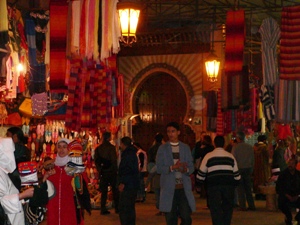
|
|
Marrakech medina
|
you will ask to tour you around a souk, will take you to his friends' shops and will get a commission on what you will buy.
The presence of Tourist Police (a special Police corp created to defend tourists from the attacks of false guides), particularly active in Marrakech, decreased the negative effects of heavy tourist hunting but now terrifies Moroccans, who may ask you to obtain an authorisation to move around together (in this case, just do it, it costs around 0,2 Ä and a half-hour queue in the Police office, which is a worthy experience); with this authorisation, signed (by you only) and stamped (by the Police), you donít risk that your guide will be imprisoned for two days.. if you are stopped without authorization, explaining that you are simply with a Moroccan friend will not help at all.
NEGOTIATION
In Morocco everything (or almost) is negotiable: do not get annoyed if you realize that they are asking for a price that is ten times higher than the nearby shop, that is their negotiation style and is part of the game. Practice negotiation with all the required time, accept the mint tea they will offer you for sure, and invent subjects and tricks to prolong the negotiation as long as possible: at the end you will obtain better prices (and donít worry, you will not ruining anyone, even if they might convince you of that), and if the negotiation is carried on in a clever way by both sides at the end you will become better friends (usually Moroccan salesmen apreciate tourists committed into negotiation, even if that could mean a slightly lower extra-profit).
SOUVENIR AND PROTECTED SPECIES
In North-Africa colourful markets you may often find a huge amount of items made of parts of wild animals or plants (as for instance musical instruments and bellows for the fireplace made of turtles and reptyles' skin items), or even living creatures: many of these souvenir, as well as living tortoises, chameleons or lizards, require a certificate, while others may be totally forbidden for international trade (and therefore, not allowed to Europe import).
Always be guided by commonsense: in case of doubt, avoid!
In Djemaa el Fna square in Marrakech, as well as in other squares in other Moroccan towns, there is the habit to show either small monkeys on a leash or poor stunned cobras: the aim is to provoke the tourist to take a photo and then oblige him to pay for the click. Remember that all the monkeys you will see are awfully treated and are ridiculed with collars, chains and nappies, and they are a protected species! They might even try to sell it to you.. The suggestion is: boicot the photo with the monkey or with the snake, if the aim stops giving fruits maybe the phenomenon of their capture might decrease.

|  |


